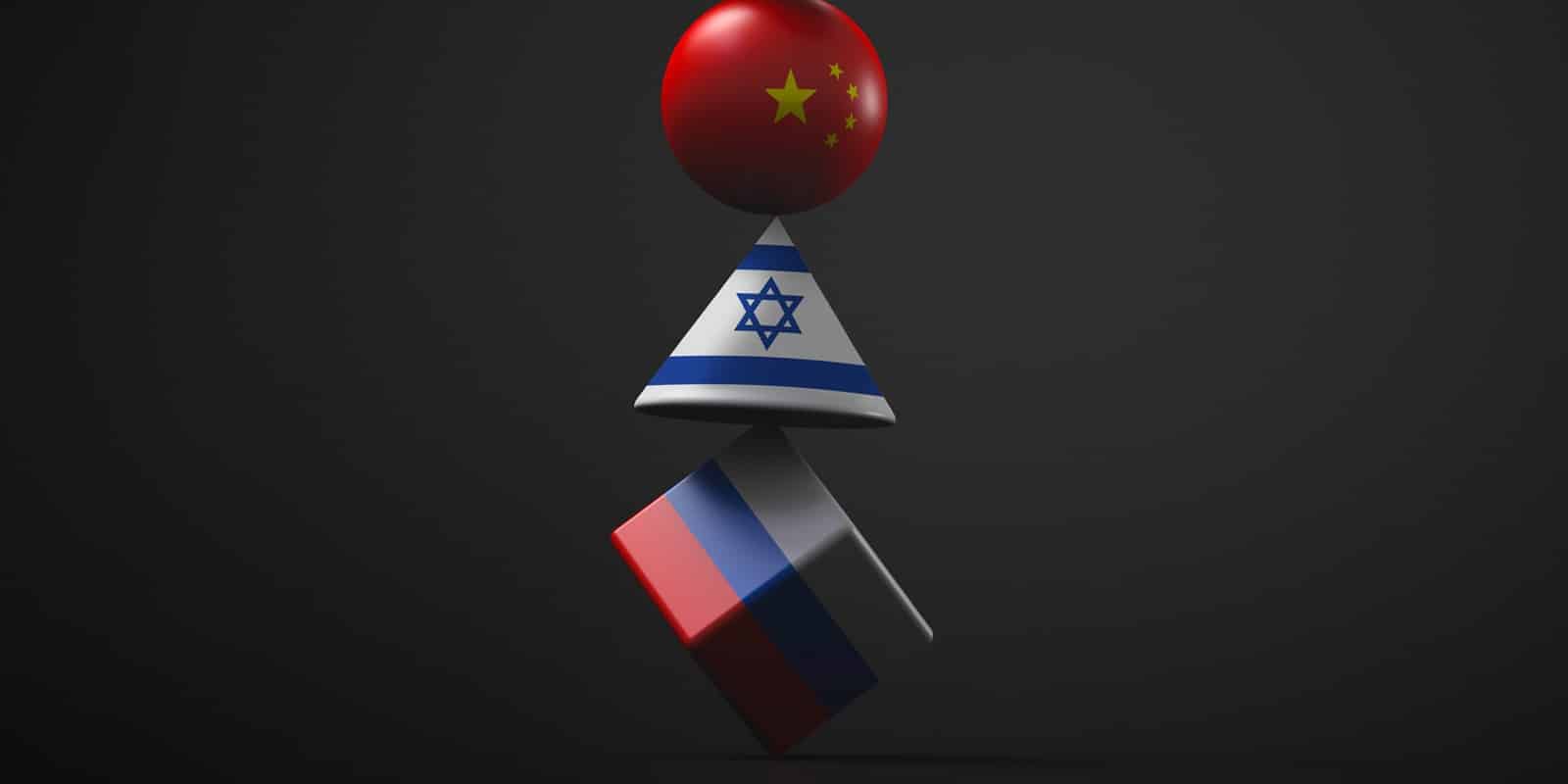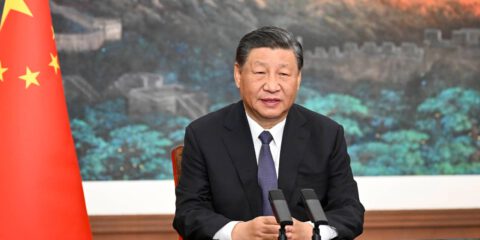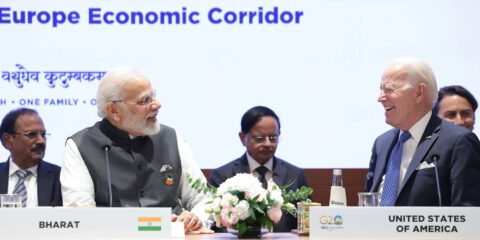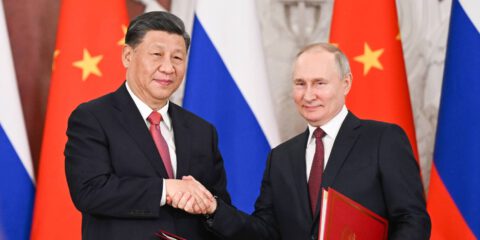Despite their mutual support throughout the first hundred days of the war, Russia and China continue to have competing interests. Whereas Israel needs to be more responsive to Washington’s concerns about its two global competitors, it must also be mindful of populist calls to destabilize relations with Moscow and Beijing.
The personal friendship between Russian President Vladimir Putin and Chinese President Xi Jinping is the most tangible indication of the substantial transition in China-Russia ties from demonstrated enmity during the Cold War to collaboration against the West today.
Putin visited his “best friend” in Beijing early February as the Winter Olympics’ guest of honor. The summit was capped off with a joint statement declaring that the two countries’ friendship is “without limits” and that there are “no ‘forbidden’ areas of cooperation,” as they voiced a common hostility to the US and NATO. Three weeks later, Putin invaded Ukraine.
Indeed, China and Russia’s economies are strongly aligned, with bilateral trade expanding from $8 billion in 2000 to $140 billion in 2021. A business dialogue in Russia on Thursday saw the two nations pledge to maintain regular economic and commercial relations and increase bilateral trade to $200 billion by 2024.
China is the world’s largest consumer of energy and grain, while Russia is a major supplier of petroleum, natural gas, coal, and agricultural products. According to oil shipment tracking and traders who spoke with Reuters, China is taking advantage of the Western energy embargo for cheap energy imports.
The necessity for mutual assistance heightened in May 2022, following US President Joe Biden’s first tour to Asia since taking office. He pledged to defend Taiwan against a Chinese invasion for the third time, despite America’s long-standing policy of “strategic ambiguity” on the issue.
Biden also visited South Korea and Japan, unveiling the Indo-Pacific Economic Framework (IPEF), which appears to form the economic pillar of the Indo-Pacific Strategy of Washington and its allies. Its proponents embrace the concept of a “free and open Indo-Pacific” (FOIP) against China’s expansive claims over the South and East China Seas.
Biden’s visit also saw the third Quad summit, which brought together the United States, Japan, India, and Australia – like-minded democracies in the Chinese containment effort.
According to his national security adviser Jake Sullivan, Biden’s Asia tour was intended to demonstrate that the United States could “lead the free world” against Russia while also charting a path forward in the Indo-Pacific region, that is, a future that is not led by China.
This followed American criticism of Beijing’s “pro-Russian neutrality” in the Ukraine war and the White House’s anticipation that Xi would pressure Putin to cease the bloodshed. Lumping the two together, Biden categorized the conflict as a “battle between democracies and autocracies.” At the same time, Secretary of State Anthony Blinken tethered China to Russia, saying they are “on the wrong side of history.”
Even after the onset of the war in Ukraine, the United States continues to view China as its primary security concern. Blinken outlined the Biden administration’s China strategy at the end of May, emphasizing that “even as President Putin’s war continues, we will remain focused on the most serious long-term challenge to the international order – the People’s Republic of China.”
Blinken did qualify his remarks by saying that the United States “is not looking for a conflict or a new cold war.” Still, China slammed his words as “saying one thing and doing another,” pointing to the fact that the US Indo-Pacific fleet will lead the Rim of the Pacific Exercise (RIMPAC) in June. It is dubbed the “world’s largest international maritime exercise,” with the participation of 25,000 personnel from 26 countries (including Israel).
Since Russia invaded Ukraine, Chinese pundits have denounced domestic critics of Russia’s brutality and violation of the UN Charter. They emphasized the importance of Russian support in the event of a comparable future scenario in the South and East China Seas, particularly around the Taiwan Strait.
Other Chinese analysts have claimed that Putin’s loss to Ukraine and the West could mean China would be “next in line.” According to recurring motifs in the party-state media, the US-led West is using the war to “intensify its repression and containment against China.”
The conflict in Ukraine highlights the relevance of the US alliance system, which provides military assistance to Kyiv while Moscow battles on its own. China, like Russia, has only itself to rely on, with only one outdated formal military alliance with impoverished and isolated North Korea. The military value of the Islamist “Iron Brother” Pakistan is equally limited in Beijing’s eyes.
The two autocratic governments have tightened military cooperation because of growing US pressure. As the Quad leaders gathered in Tokyo, Russian and Chinese fighter jets flew a joint sortie near the Japanese border.
Similarly, as new mass graves are found near Bucha and Mariupol’, Xi Jinping reiterated his support for Moscow on “sovereignty and security” issues during his birthday call by Putin earlier this month.
It’s Not All Roses
Despite solemn pledges of an “unlimited” partnership, Russia and China’s mutual trust is constrained.
Since the start of the war, Chinese officials have emphasized that the two nations do not have a military alliance, and no indication of Chinese security aid to Russia has been documented.
Before the war, Russia refused to give China its most advanced military technologies, while Chinese hackers were repeatedly caught red-handed attempting to get into Russian defense industry servers.
On the security and political fronts, Russia is aggressively projecting its power in Europe, the Middle East, and Africa, whereas China is primarily focused on economic development. In Central Asia, on the other hand, China is encroaching on Russia’s traditional sphere of influence.
A cursory glance at the map reveals the immense security risks associated with the collapse of the giant from the north, with whom China shares a 4,000-kilometer (2,485 mile) border.
Still, even the signing of the border agreement in 2003 could not erase its bloody history. Chinese nationalists who want to unite the mainland with Taiwan still pine for Vladivostok and large swaths of territory in the northeast that the Qing Dynasty was forced to hand over to the Russians in the 19th century, as they glare at independent Mongolia, which is predominately separated from China’s Inner Mongolia due to erstwhile Soviet interference.
Russian thinkers, on their part, are concerned that China will take advantage of Russia’s vulnerability and the dearth of residents in its large eastern region in the future. Speculation that Russia would become China’s protectorate is as terrifying to the Kremlin as Western hegemony in international affairs.
China and Russia’s hostility to American leadership is the only unified vision for the future of the international system. Aside from that, China benefits the most from the liberal world order and Western-led globalization.
Relative economic prosperity and stability have propelled the country to its position as the world’s second-largest economy. Compared to Russia’s subversive efforts to upend the existing order, Beijing is adopting incremental changes that will give its interests more weight in the long run.
Ties with the West do not overlap either. Despite China’s belligerent statements, it needs the West’s aid to confront a series of systemic challenges that stand in the way of realizing the “Chinese Dream” of a rejuvenated modern socialist state: the need to strike a balance between two years of pandemic and draconian lockdowns against a faltering economy, shifts due to comprehensive socio-economic and political reforms, an aging population, climate change, pollution, as well as other domestic challenges.
China’s trade volume with the US is $657 billion, and $828 billion with the EU, dwarfing its trade with Russia. These numbers could explain why government banks and Chinese enterprises comply with Western sanctions (for the most part), and Sino-Russian business deals are kept under wraps.
Russia’s international standing after the invasion has sustained critical damage, and its military has suffered significant losses. Still, its resource-rich economy has shown remarkable endurance, as evidenced by eight years of sanctions. In any scenario of stabilization in Ukraine, Moscow is likely to continue to play a prominent role in the global arena.
Considering this, the international community is divided on the conflict in Ukraine, with many countries opting for a cautious hedging approach to the major-power competition while securing their particular interests concerning Russia and China. India, the Gulf states, Southeast Asian countries such as the Philippines, and other longtime US allies, have defied the economic sanctions and avoided cutting ties with Moscow. This is comparable to their aversion to taking a side in the geopolitical competition between China and the US.
The crisis exemplifies the international system’s polarization and division, with the Western camp emerging stronger and more united. Nonetheless, its economic and military might will not allow it to reclaim the global dominance it enjoyed following the collapse of the Soviet Union. In the last fifteen years, democracies have steadily lost ground to autocracies, with fewer than a fifth of the world’s population living in entirely free countries, according to Freedom House. Most countries on the globe still maintain an undemocratic system, and their leaders are comfortable with the values represented by Putin and Xi.
Implications and Recommendations for Israel
Israel is under continuous pressure, particularly from the White House, which urges it to downgrade ties with Moscow and Beijing.
The challenges confronting decision-makers in Jerusalem are more complex than in non-democratic countries. In contrast, Israel considers itself a member of the Western camp, with a shared vision and values. Israeli public opinion reflects this in its support for Ukraine and disdain for Putin.
The multiplicity of security challenges in Israel’s strategic environment makes it almost impossible for Israel to cut political ties with Russia or on economic matters with China. Russia is likely to maintain its dominance in Syria, functioning as a crucial player in preventing Iran’s entrenchment.
Thus, it is a significant factor for the Israeli Defense Forces (IDF) in planning contingencies in Syria or Lebanon. Moreover, Israel is concerned that deteriorating relations with Putin’s administration may negatively impact Russia’s sizeable Jewish community and Jews living in newly occupied Ukrainian territory.
Despite the pressure, Israel has tread carefully, condemning the Russian aggression unequivocally while maintaining contact with both the Kremlin and Ukrainian President Volodymyr Zelensky, with Israeli Prime Minister Naftali Bennett making a concerted effort at mediation.
Jerusalem has provided Ukraine with substantial humanitarian help but has refused to equip it with lethal weaponry. While the Jewish State is publicly chastised domestically and globally for not being “on the right side of history,” Western governments and scholars understand Israel’s precarious situation well.
At the same time, the United States has been pressuring Israel to reduce its links with China since the Trump administration took office. The Biden administration’s perception that China is the primary threat to the world order harkens to the acceleration of negative trends in Jerusalem-Beijing ties.
This was demonstrated in recent reports about Chinese companies losing out in a light rail tender in Israel, as well as the unrealistic demands by the Chinese embassy in Tel Aviv that the Jerusalem Post censor an interview with the Taiwanese Foreign Minister, issuing a threat to downgrade diplomatic relations with Israel.
Still, Russia’s continued prominence in international affairs is doubly true of China, which is expected to overtake the United States as the world’s largest economy in the next decade. China-Israel trade is booming, and the conclusion of a free trade pact in the coming year will boost it further.
Furthermore, as America’s influence in the Middle East diminishes, China is working hard to enhance and institutionalize its strategic links in the region, with leading Chinese experts suggesting that the current conflict in Europe may accelerate this process.
There are also divergent perspectives on Russia and China inside the Western camp. The calls for Israel’s leadership to part ways with Moscow and China to be “on the right side of history” would mean that the country would have to bear heavy and long-term strategic costs with relatively obscure benefits.
Israel is acting shrewdly by avoiding abrupt changes in its relations with China and Russia, and it must continue to formulate separate policies toward Beijing and Moscow. It must continue to strike a balance between the possibility for deeper practical engagement with China and the sensitivity and security concerns of the West, as well as the implication for its national security and economic resilience.
Israel should maintain its communication channels with Russia while not withholding criticism of Moscow’s conduct in Ukraine. Its position not to supply Ukraine with lethal weapons is justified, but it should continue to balance it with the delivery of defensive military aid and humanitarian support.
Finally, in the age of escalating great power competition, Israel must maintain frequent dialogue with Western policymakers and show increased transparency considering its relations with Russia and China.
JISS Policy Papers are published through the generosity of the Greg Rosshandler Family.
Photo: Freepik









 - בניית אתרים
- בניית אתרים